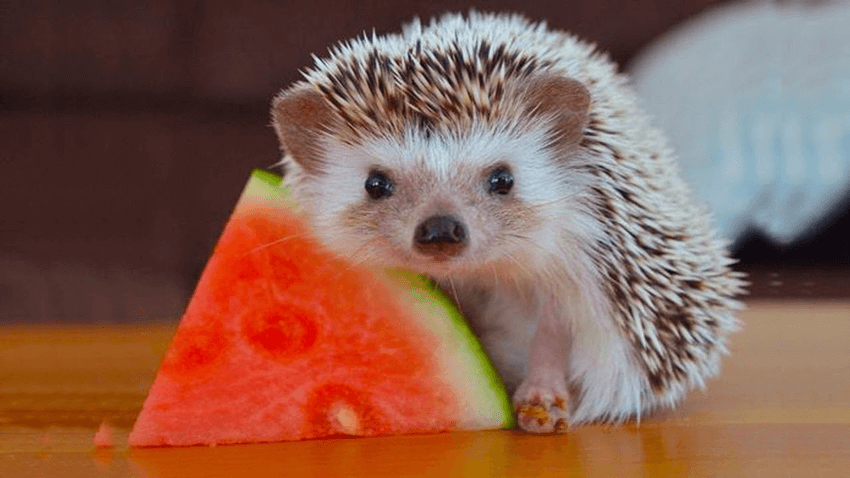Hedgehogs are beloved for their adorable appearance and their spiky, unique bodies. However, many people are unaware of their dietary habits. Understanding what do hedgehogs eat is crucial for those who wish to care for them properly, as it helps ensure their optimal growth and health. Whether in the wild or in captivity, knowing their food preferences and nutritional needs can make a significant difference. This article delves into the eating habits of hedgehogs, their food types, and how to provide a balanced diet for pet hedgehogs.

Hedgehogs are omnivores, meaning they eat both animal-based protein and plant-based foods. Their diet varies depending on their environment and availability of food sources.
The primary source of protein for hedgehogs includes:
Insects:
Crickets, mealworms, earthworms, beetles, and centipedes.
Mollusks:
Slugs and snails are a delicacy for hedgehogs.
Small Vertebrates:
Occasionally, hedgehogs may eat small frogs or young mice.
To balance their diet, hedgehogs also consume some plant-based foods:
Fruits:
Apples, bananas, and berries provide natural sugars and water.
Vegetables:
Carrots, squash, and cucumbers offer fiber and vitamins.
Eggs:
Cooked eggs are an occasional protein-rich treat.
Pet Food:
High-quality cat food or hedgehog-specific food can provide essential nutrients.
In the wild, hedgehogs rely on their keen sense of smell and mobility to forage for food. Their wild diet typically includes the following:
Insects such as beetles, crickets, and ants are staple foods for wild hedgehogs.
Slugs and snails provide protein and moisture.
When insects are scarce, hedgehogs may consume small vertebrates like frogs, lizards, and baby rodents.
During summer, hedgehogs may eat fallen berries, apples, and figs to stay hydrated and energized.
Hedgehogs may scavenge animal carcasses or eat bird eggs when food sources are limited.
Hedgehogs kept in captivity require a well-rounded diet to ensure they remain healthy and active.
Insects: Pet hedgehogs enjoy freeze-dried or live mealworms, crickets, and earthworms.
Cooked Chicken or Fish: Offer small amounts of boiled, unseasoned chicken or fish as a protein boost.
Cat Food: High-protein, low-fat cat food is commonly used as a staple for pet hedgehogs.
Hedgehog-Specific Food: Specially formulated hedgehog food provides balanced nutrients tailored to their needs.
Safe Fruits: Apples, strawberries, blueberries, and watermelon are suitable in small amounts.
Safe Vegetables: Carrots, squash, and cucumbers are good options for fiber.
Avoid Certain Foods: Do not feed cruciferous vegetables (like cabbage and broccoli), which can cause bloating.
Dairy Products: Hedgehogs are lactose intolerant, and milk or cheese can cause digestive issues.
Nuts and Seeds: High in fat and can pose a choking hazard.
Human Processed Food: Foods with salt, sugar, or additives should be avoided.
Hedgehogs are nocturnal creatures, meaning they forage for food at night and rest during the day. Pet owners should provide food during evening hours.
Hedgehogs require a diet rich in protein and low in fat to maintain a healthy weight and energy levels.
Hedgehogs are solitary animals and prefer to eat alone. Ensure each hedgehog has its own food dish to avoid competition.
To prevent overeating and obesity, it is recommended to feed hedgehogs at the same time daily and in measured portions.
Possible Causes:
Low temperature causing a slowed metabolism.
Boredom with the same food or poor-quality food.
Illness or stress.
Solutions:
Maintain the enclosure temperature between 24–28°C (75–82°F).
Offer fresh, varied food choices and avoid handling the hedgehog too much during feeding time.
Cause:
Overfeeding fruits or providing high-sugar fruits.
Solution:
Limit fruit portions and avoid high-sugar fruits like grapes or persimmons.
Recommendations:
Reduce fatty foods like mealworms and nuts.
Increase exercise by adding wheels or toys to encourage movement.
| Food Category | Recommended Foods | Notes |
|---|---|---|
| Insects | Mealworms, crickets, earthworms | Can be live or freeze-dried but feed in moderation. |
| Meat | Cooked chicken, fish | Boiled, unseasoned, and boneless. |
| Fruits | Apples, strawberries, blueberries | Remove seeds and cut into small pieces. |
| Vegetables | Carrots, squash, cucumbers | Avoid vegetables that cause bloating. |
| Commercial Food | Hedgehog food, high-protein cat food | Ensure low-fat, high-protein formulas. |
| Prohibited Foods | Dairy, nuts, processed foods | Can cause digestive issues or choking. |
No, hedgehogs are lactose intolerant, and drinking milk can cause diarrhea.
It is not recommended. Raw meat may contain harmful bacteria or parasites. Always provide cooked, unseasoned meat.
Yes, cooked eggs (boiled or scrambled without seasoning) are a good source of protein.
An adult hedgehog should consume food equal to about 5–10% of its body weight to maintain a healthy physique.
Yes, hedgehogs need clean, fresh water available at all times. Use a water bowl or a drip bottle and change the water daily.
To answer what do hedgehogs eat, we find that their diet includes both animal-based and plant-based foods. Hedgehogs are omnivorous, with a diet heavily focused on insects but supplemented with fruits, vegetables, and protein sources like chicken or eggs. In captivity, providing a well-balanced diet is key to keeping them healthy and active. By understanding their natural dietary needs, pet owners can ensure their hedgehogs thrive and lead a happy, healthy life.
animal tags: hedgehog
We created this article in conjunction with AI technology, then made sure it was fact-checked and edited by a Animals Top editor.